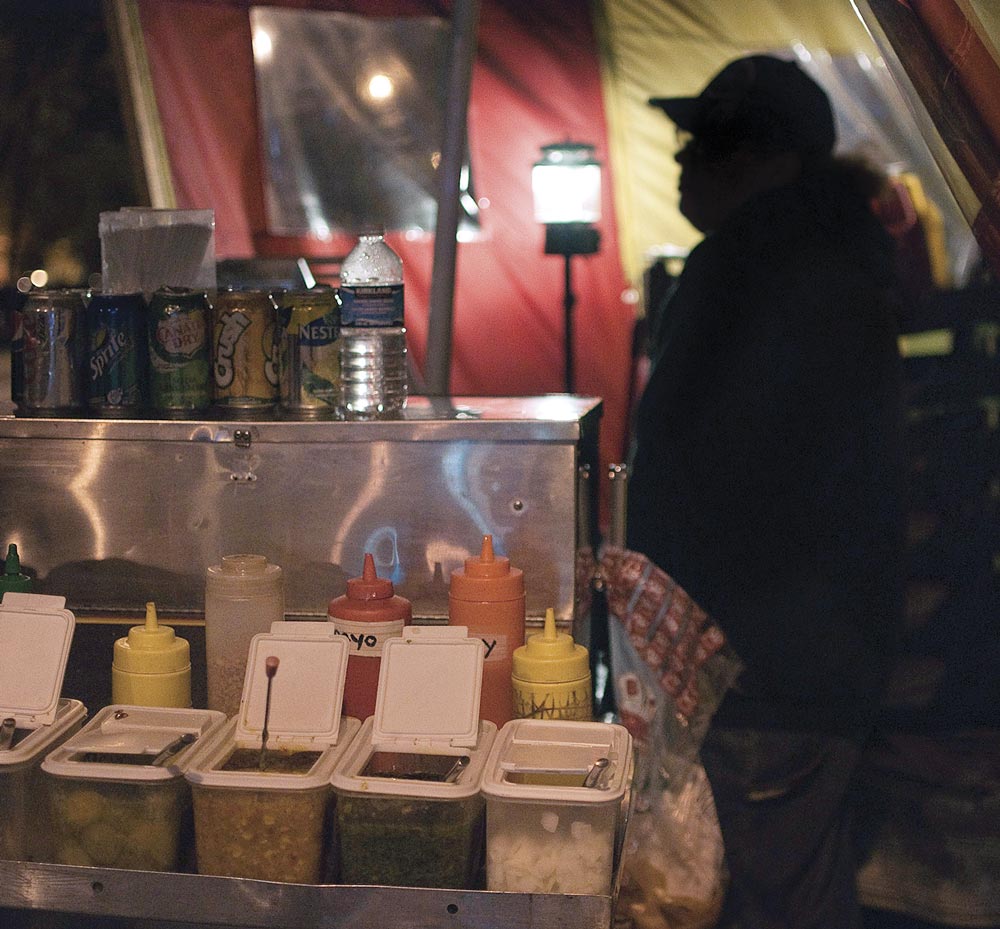Church Street hot dog stand is overworking and underpaying employees. News editor Mariana Ionova reports
For Katherine*, a night shift cooking hot dogs in the freezing cold means ending her 14-hour shift at 10 a.m. with only $80 to show for it.
To be able to work there, Katherine must pay for a $350 food handler’s permit each year. She has worked at the hot dog stand on the corner of Gould and Church Streets for the last two years. She runs the stand two nights per week and her fiancé Brad works five nights a week for $80 a night. They put up with the arrangement because their monthly welfare cheques are not enough to pay for their bills and groceries.
“Eighty bucks is not a lot of money,”she said. “We will work all this week to pay our Rogers bill,” she said.
Although the $5.70 they earn per hour is not enough, the fact that they get paid in cash makes it impossible for them to demand the legal minimum wage of $10.25. Tips from patrons supplement their wages to an extent, but Katherine receives only about $10 to $15 from customers on an average night.
Their employer, Gheorge Calinoiu, has been running the stand for 20 years and employs another two workers for the day shifts, who also receive $80 for 10 hours of work. He said the low wages are largely because his business does not generate much money in the first place.
“Every year, I put out $1,000, $1,500 out of my own pocket to keep people working, because they need jobs, they need to pay their bills,” said Calinoiu.
But Katherine recalled that on certain busy nights, like Nuit Blanche, the stand made nearly $1,100 dollars in sales.
Calinoiu, who also owns the Victoria Lane cart, argued that he keeps the hot dog stand running during the night not because it benefits him financially but to help Katherine and her fiancé earn more income.
“I keep it open to help them and most of the time they’re sleeping, it’s not very busy,” he said.
But after an attempted robbery early Tuesday morning, Katherine’s boss threatened to close the stand during the night, putting both her and her fiance out of work.
“It doesn’t make sense to run a business that makes no money,” explained Calinoiu.
The Ministry of Labour is responsible for monitoring employers by conducting planned and random inspections to ensure that such labour law violations do not occur. But, spokesperson William Lin noted that, with approximately 370,000 employers in Ontario, not everyone can be monitored. Lin argued that the best option for workers in such situations is to file a complaint in order to bring the problem to the attention of the ministry.
“We strongly encourage workers to file a complaint if they feel their rights are being violated,” said Lin, adding that under the Employment Standards Act, employers are not allowed to fire or punish workers for it.
But Katherine said she has never seen anyone monitoring labour practices and wages.“They don’t check how much we’re getting paid. They just check if we have permits to work here.”
Calinoiu also said no officials check if labour standards are being obeyed, which is why he is able to work out such work arrangements with his employees. “Nobody asks you ‘who worked how long,’” he said. “But if you pay people, they’ll work 10-12 hours.”
Although this occurs on campus, Ryerson President Sheldon Levy said there is nothing the university can do because the hot dog stand is technically on public property.“They are governed by the city and not by Ryerson,” said Levy. “We have never intervened in what should be the city’s responsibility.”
*Katherine has asked for her last name to be anonymous












Leave a Reply